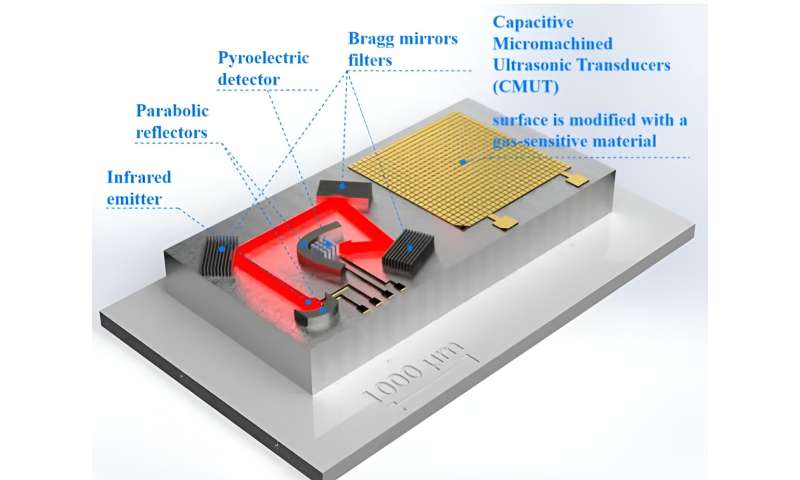Scientists develop sensors to reduce the price of greenhouse gas detection

A team of scientists led by Kaunas University of Technology (KTU), Lithuania researcher Darius Viržonis has developed gravimetric sensors that can detect greenhouse gases such as carbon dioxide, methane, and others. The researchers believe that gravimetric sensors are a perfect alternative to electrochemical sensors currently in use, as they are more sensitive and use less energy.
Dr. Viržonis and his team won the Sails of Europe 2023 award "For Investment in Innovation in Business," organized to recognize the value-creating EU-funded projects in Lithuania for this invention.
Gravimetric gas sensors are already attracting investors' attention
The team of the scientists came up with an idea to apply a certain measurement principle, gravimetry, to the development of the sensors. Viržonis believes that the invention is a significant achievement.
"Gravimetric gas sensors are an innovation, and we are delighted that our prototypes are already attracting interest from potential users. Perhaps we will be able to become forerunners not only in science but also in the market," says Dr. Viržonis.
The sensors they have developed work on the basis of micro-technology-based ultrasonic transducers (CMUTs), explains the researcher: "This is a way to make arrays of microscopic-sized cells that vibrate at a frequency of several million times per second. As the vibrating elements are very small, their moving mass is also small, which makes them very sensitive to external objects attaching to their surface."
The principle of gravimetry is based on changes in the oscillation frequency of the sensing elements in sensors that measure air pollution and also indicate a change in mass, which allows the detection of bound substances and specific molecules.
Focusing their research on the environment, the science team decided to use the sensors to record greenhouse gases such as carbon dioxide, methane, water vapor, sulfur dioxide, nitrogen oxides and diesel fuel molecules. According to Viržonis, this technology offers a wide range of possibilities for detecting biological pollution and can even detect virus DNA.
Discussing contemporary technologies, Dr. Viržonis notes that they allow for the development and production of a wide variety of gas sensors. However, the majority of the market is still occupied by so-called electrochemical gas sensors, which do not meet the requirements of the growing safety and environmental standards.
"Gravimetric gas sensors are one of the booming alternative sensor technologies that have the potential to replace many of the electrochemical sensors currently in use, as they have higher sensitivity, better selectivity, interact with different gases, and consume significantly less energy," says Dr. Viržonis.
Technological basis for the diagnosis of viral diseases
One of the research objectives is to make air quality monitoring more accessible and cheaper. According to the scientists, the size of the sensors helps to achieve this goal.
"Our sensors can, in a way, be seen as scales weighing molecules. If you make the scales very small, you not only increase their sensitivity and accuracy but also reduce their cost and energy requirements. This creates the technological prerequisites to have more functionality at the same price or maybe even cheaper," says Dr. Viržonis.
He explains that if air quality or pollution measurement devices become widely available in terms of cost and functionality, which is possible with the help of the new technology invented by scientists, technical preconditions for better control of anthropogenic greenhouse gas emissions will be created.
"If this control is ensured, we will all live under cleaner air, we will have more biodiversity, and perhaps we will be able to reclaim the territories in East Asia that have already been practically lost to humanity due to air pollution," says the researcher.
Reflecting on the future, the scientist stresses that this project is technological and particularly useful for future health research. The same technological basis can allow the development of more versatile and sensitive tools for the diagnosis of viral diseases, making it an invention with great potential.
The award is a proof of that.
"It is as important for a scientist as it is for an artist or any other creative professional to be noticed, seen, and appreciated. Together with the project team, we took this award as a form of recognition and encouragement to keep going, which is what we are doing now," says Viržonis.
The scientists have begun developing a startup company called Orius, whose task is to bring the developed technology solutions to the market, to find the right niches and the right users for the sensors developed.
Provided by Kaunas University of Technology